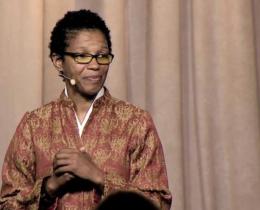Omega: How do you define archetypes?
Laurence: Archetypes are universal patterns. They are the common ways that all humans experience things. Archetypes are expressed differently by different cultures, but these various representations all refer back to the underlying patterns that are recognized by everyone.
Omega: Laurence, how have you used archetypes in your work with planetary astrology?
Laurence: I call it archetypal astrology, and it basically means that the planets are representations of 10 universal archetypes. To me, reading someone’s chart is like watching a play. There’s always drama going on in the heavens, and I use that as the main metaphor. The particular constellation at the time of your birth has a certain set of actors that then play out their drama on the inner stage of your life.
Omega: Richard, could you explain the role of archetypes in your leadership work?
Richard: I use the archetypes in the plays of Shakespeare to train leaders. For example, in Henry V, they speak about Mars, the warrior archetype, in the prologue. These archetypes become a helpful shorthand for people to be able to diagnose different leadership styles. Then on a behavioral level, we look at how people show up in different situations. We look to build the capacity to bring a different character center stage when necessary, to meet any situation that is live and current. Most people operate from a single archetypal perspective and can maybe switch to one or two more. We want leaders to be able to consciously access all 10.
Omega: How do we learn which archetypes we use the most?
Laurence: One way is to look at your chart and use that as a guide. But if we don’t have access to that, we have a deck of cards that we have people use to self-identify and self-assess. Simply by flipping through the cards, people can identify which ones they use every day and which ones are underplayed.
Richard: We’ve also now developed a series of gestures and statements for each of the characters. We have people run through these 10 gestures and their matching sentences and, in about a 3-minute period, they get a felt sense of which archetypes they respond to.
Omega: How does it work to change your archetype in real-time, like in a situation where someone realizes they need to be a warrior, but they aren’t so familiar with that archetype?
Richard: People need to practice first. We do a series of exercises to help people learn to do this. Let’s say you want more access to Mars, the warrior archetype. You do some warm-up moves—maybe do a few karate moves and throw a few punches into the air—to inhabit and marshall the energy. From that space, we practice engaging in the challenging conversation where we invite them to continue finding that energy in their body and in their voice so they can later transfer it into a real-life situation. We treat this like a rehearsal and you learn to get into character.
We’ve also developed something we call breakthrough coaching, which uses a form called systemic constellation. We stage a situation where other people represent your inner parts and the outer challenges. We set them up on stage and work through your scenario that way. It’s amazing how everyone begins to inhabit their roles in appropriate ways.
Omega: Can you give me an example?
Richard: We often work with people in transition to a new job, new project, new leadership role, etc. And what we find to be almost universally true is that what got them where they are is not going to get them where they need to go.
So if they've earned their spurs by being an aggressive, assertive, warrior-style manager, and then they suddenly get promoted to maybe a vice-president role where they need to engage lots of different stakeholders in dialogue, they probably haven't got a great nurturer archtype—the one who would be most inclined to listen to and deliberately solicit lots of different opinions.
In staging the constellation, we would have them negotiate with their inner warrior and their inner nurturer. We’d start by convincing the warrior to take a break and stand down.
Laurence: Because the archetypes get addicted to us utilizing them in the same way, we get addicted to using a particular archetype to get what we want done. So there is a kind of decoding or a decoupling of over-identification with an archetypal pattern that almost always needs to take place before you can effectively recode a different pattern or truly embrace a newer archetypal character on your inner stage.
Omega: Laurence, how do you use this method with people who are working with a personal issue?
Laurence: People usually come to me because something is hurting or isn’t right and they want to know what’s going on, why it’s going on, and how to make it better. To paraphrase Nietzsche, a woman can take any 'what' if she knows 'why.' So the knowing 'why' on an archetypal level is incredibly relieving.
Once you know the why and meet the archetypes in your chart, we work with them. We work with the deeper translation of what the archetype is saying to you and how you might express it differently. For example, if Mars is a dominant archetype, but the only way you know how to express it is to be mean or beat people up, then we look at how to move him along the scale.
Omega: Are we looking to get rid of an archetype that’s not helpful, or are we looking to moderate it?
Laurence: You can't get rid of an archetype. People have tried! But you can't. My core philosophy is you do the Gods, or the Gods do you. Which means either you're doing Mars consciously or Mars is doing you.
If you have outbreaks of rage or people yelling at you or crashing into you in their car—or maybe you keep cutting yourself in the kitchen or when shaving—these are all examples of Mars doing you. But when you do Mars, you focus on a target. Maybe you fight for a cause and give Mars something to do that you consciously want.
I sometimes think of the archetypes as 10 kids in a room. You can’t say, “You know, I don’t like redheads,” or the redheads are going to go into the kitchen and break all your plates! So instead, you find something smart to do for that Mars so you can focus on encouraging the other kids, just like in a classroom.



